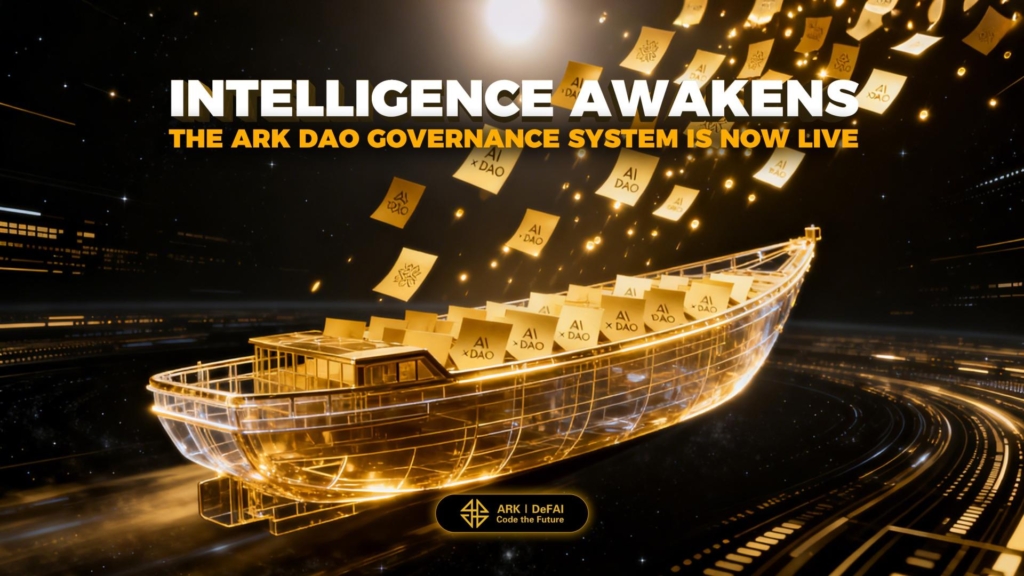ARK (Ark DeFAI), a protocol operating at the intersection of decentralized finance (DeFi) and artificial intelligence (AI), has officially announced the launch of its DAO Governance System. This rollout marks a significant milestone in the project’s technical development. According to the team, the system introduces a novel framework for on-chain institutional coordination.
With this release, ARK transitions from a modular architecture to what the team describes as a Fully Autonomous Governance Framework. The project states that this new phase integrates algorithmic processes with community governance mechanisms to guide the protocol’s decentralized development.
From Rules to Intelligence: Governance as the Logic of Civilization
Since its inception, ARK has operated on a modular economic architecture and an AI-driven decision engine, pushing DeFi beyond automation toward a Self-Adjusting Governance Structure. Now, every staked $ARK token functions as a governance unit, allowing holders to propose, vote, and execute decisions — all transparently carried out on-chain via smart contracts.
The system is deeply integrated with ARK’s five core modules:
EM (Emission Manager), RBS (Range Bound Stabilizer), YRF (Yield Revenue Feedback), MCL (Mint Cap Limit), and RCM (Runway Control Module), ensuring that governance outcomes directly feed back into liquidity, yield, and stability mechanisms in real time.
Carmelo Ippolito, Chairman of the ARK DAO Governance Council, commented: “Decentralized governance must evolve from static rules to adaptive structures. With the DAO now live, ARK has entered an era where intelligence drives governance and consensus executes it.”
The team describes this transformation as positioning ARK beyond a conventional DeFi protocol, characterizing it as a financial system enhanced by a neural network-like architecture.
Data as Proof of Trust: The Economic Pulse of a Decentralized Civilization
As of publication, ARK’s treasury reserves exceed USD 65 million, with over 3.55 million $ARK tokens actively staked in governance.
These figures reflect what ARK calls Structural Trust — each transaction and vote reinforcing confidence in algorithmic order. ARK is replacing authority with structure and emotion with logic, elevating financial governance from rules to civilization.
This transformation positions DeFi not as a financial experiment, but as a self-sustaining digital civilization.
“Economic design and governance design must exist as one,” Carmelo Ippolito, ARK DAO Co-construction Committee Member, summarized in its official statement — defining the project’s foundational philosophy.
First Governance Proposal Goes Live: Community Consensus Accelerates
Within the first 24 hours of DAO activation, the first governance proposal — focused on adjusting staking durations — was officially launched, and is set to open for voting within the next day.
The proposal aims to optimize staking periods and yield curves, enhancing capital efficiency and long-term stability of the protocol. According to community data, the proposal has already sparked lively debate across the ARK ecosystem, with node representatives and early holders actively contributing feedback and simulations, highlighting the DAO’s high level of engagement from its earliest governance phase.
AI in Governance: The First Symphony Between Human Consensus and Machine Intelligence
At the core of this upgrade lies the Consensus AI Layer — the protocol’s intelligent hub for decision modeling and policy simulation.
The AI layer aggregates on-chain and off-chain data to generate predictive models, risk analyses, and policy recommendations, all of which are published transparently and submitted for DAO voting.
This “AI Recommendation x Citizen Voting” Hybrid Governance Cycle represents the first true collaboration between humans and algorithms in decentralized governance.
AI does not replace human judgment — it evolves alongside it, reinforcing rational decision-making through data-driven consensus.
Through this system, ARK has become the first protocol to evolve into a Self-Learning Governance Civilization, where intelligence not only serves finance, but becomes part of the institutional fabric itself.
Governance Beyond Voting: Civilization in Self-Evolution
The launch of the DAO establishes a sustainable governance flywheel for ARK. Through Human–AI Co-Governance, the system will iteratively refine its module parameters, treasury strategies, and risk models over multiple governance cycles.
The first governance proposal, which focuses on adjustments to staking durations, marks the initial phase of ARK’s decentralized decision-making process. According to the team, future governance cycles are expected to address areas such as ecosystem module configurations, AI model licensing, and treasury management. The governance structure is designed to enable $ARK token holders to participate in protocol-level decisions.
Some industry observers have noted that ARK presents a model in which decentralized governance may operate collectively through algorithmic mechanisms—combining transparency with autonomous execution.
About ARK DeFAI
ARK DeFAI is a modular decentralized finance civilization protocol deployed on the BNB Chain, integrating AI-assisted governance mechanisms with a self-regulating economic framework.
Its architecture comprises five key modules — EM, RBS, YRF, MCL, and RCM —supported by the AI Consensus Layer and the Ark Treasury System (ATS).
Since its inception in 2025, ARK has been dedicated to building a decentralized civilization founded on intelligent coordination, algorithmic balance, and transparent governance, replacing trust with structure and authority with mechanism — redefining the future order of DeFi.
More Information: Whitepaper | Telegram Community
